Posted on: January 5, 2023, 06:22h.
Last updated on: January 5, 2023, 11:26h.
Some 36 junket operators registered with Macau’s gaming regulator to conduct business this year, Macau Business reports. That’s down 85% compared to the sector’s 2013-2014 heyday, and around 35% from pre-pandemic levels.

Macau’s casinos hit their peak in 2014, when gaming revenue was more than US$45 billion, triple that of Las Vegas. A year earlier, 235 junket operators registered to operate under license in Macau. Collectively, they were driving around 60% of the gambling hub’s casino revenues.
Those numbers waned in the ensuing years as Macau, under Beijing’s influence, began pivoting away from its reliance on the VIP market.
Anti-Corruption Drive
In 2014, Chinese President Xi Jinping’s “anti-corruption drive” began targeting the junkets and the wealthy high rollers they brought from the Chinese mainland, where gambling is illegal.
Many of these VIPs were corrupt Party officials seeking to launder their ill-gotten gains, according to the Chinese government.
Beijing accused the junkets of encouraging capital flight by offering vast lines of credit to high rollers to help them circumvent restrictions on the movement of money from the mainland.
An arrest warrant issued on the Chinese mainland city of Wenzhou in November 2021 signaled the end of the junket model as we knew it.
The subject of the warrant was Alvin Chau, CEO of mega-junket Suncity. Just days later, he was detained by Macau authorities. He stood trial last year on charges of operating a criminal syndicate, offering illegal betting, and money laundering.
Chau’s arrest was followed by that of another major junket player, Levo Chan of the Tak Chun Group. Within weeks, Macau’s major operators began to close their junket VIP rooms and sever ties with their former junket partners.
Tough Times for Junkets
These decisions were taken not just because of the arrests. At around the same time, Macau’s high court determined that casino operators were jointly liable with junket operators for deposits made at junket VIP rooms. That meant the relationship would no longer be relatively risk-free for the operators.
Meanwhile, new regulations brought in with Macau’s new licensing regime on January 1 have heaped further restrictions on the junkets. The new rules mean they can now only work for one of Macau’s six concessionaires at a time, earning a commission that is capped at 1.25% of rolling turnover, rather than the previous revenue-share model.
Junkets must also pay higher fees for the privilege of doing business, and are prohibited from accepting deposits from casino patrons.
